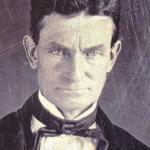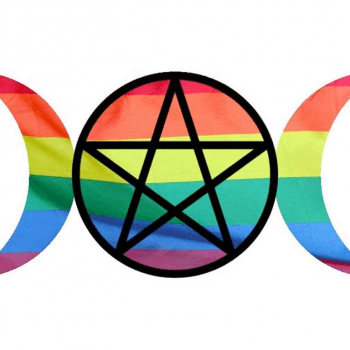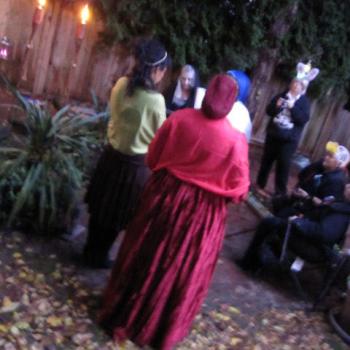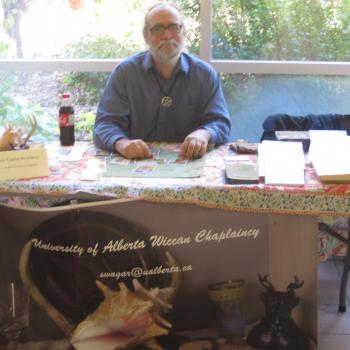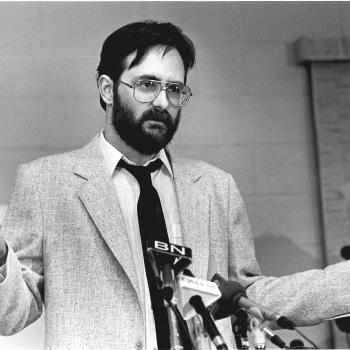
As part of the unfortunate anti-intellectualism and anti-authoritarian hippie leftover streak in the Pagan and Wiccan movement, reactive opposition to formal structure, or kneejerk relativism, many assert that Wicca has no theology, or at the least no theological absolutes which define the boundaries of our religion. This is arrant nonsense, of course. While we should steer clear of dogma, Wicca has a well-established set of sources, a history and insights derived from these things and from three generations or more of practitioners and their encounters with the Gods. There are beliefs and practices that are undoubtedly Wiccan, because they were the beliefs and practices of the founders of the religion in the 1940s and 1950s, and others that seem to be reasonable developments from those foundation beliefs and adaptations to the circumstances in which we find ourselves, still others which complement them and finally a very large set of ideas that simply are incompatible with Wicca.
We are polytheists who see the divine as both female and male, Goddesses and Gods (with Goddesses taking a slight precedence over Gods). As a natural consequence, both women and men are capable of embodying the divine and acting as clergy and, in many cases the value of a balance of female and male will require groups to have both Priestesses and Priests. As “all acts of love and pleasure are acts of praise,” pleasure and the joys of life, including very definitely but not limited to all forms of consensual sexual pleasure, are routes to the divine and deeply meaningful, naturally leading to equality of gays, bis, lesbians and straight people. Magic works – psychic powers and abilities and the underlying truths of the mystical path are central to our religion. The conscious creation and nurture of an egregore and the awareness that deity exists in and through its worshippers, and that these spiritual “blood banks” can give worshippers strength and support, should shape ritual and community events for Temples. Calling upon the Guardian Spirit of the Temple or the Ancestors is not simply rote – it awakens these spiritual forces and makes their help available for the worship group.

I will have to qualify this by saying that it is the ideas of the clergy and Initiates that I am considering here. The broader movement around Wicca, which has drawn willy-nilly from the New Age, science fiction and fantasy, role playing games and ideologically driven popular fiction and scholarship, plus a dash of this and that, hardly has a theology. There is a cluster of neo-Pagan religions which derive from roughly the same sources and all call themselves Wiccan. They differ considerably in details of ritual work and in their approach to trance and ecstatic work. I accept a conservative definition of Wicca, meaning those groups in the broadly “British Traditional” stream, which are most like the original Wiccan religion, and the public groups influenced directly and led by Initiates into them. This conservative faction represents what is uniquely and typically Wiccan in its approach.
Wicca is rooted in an Initiatory Mystery religion of clergy that was founded in the United Kingdom in the late 1940s and early 1950s by a group of occultists led by Gerald Gardner and his Priestesses, most notably Dafo (Edith Grimes-Stafford) and later Ameth (Doreen Valiente). It grew out of an occult milieu and its influences can be traced back several hundred years – good histories of this milieu and of Wicca are Joscelyn Godwin’s Theosophical Enlightenment and Ronald Hutton’s Triumph of the Moon.

Wiccans view mystical experience as an essential part of clergy training and expect their advanced clergy to undergo trance experiences on a regular basis. We see mystical experience as providing energy and correction to all else that happens in the religion. We do not view the mystical as inexplicable but work rationally to train individuals that are recognized as talented in trance states to undergo these experiences on behalf of the entire community. The neo-Pagans emphasize individualism and nature-centredness more strongly, often use the same symbols and celebrate on the same occasions as Wiccans but there are some substantial differences – a greater influence from the New Age movement, leading to a greater emphasis on the ‘teachers’ for one example.
There are also a great number of mythological and theological documents from Greek and Roman and other sources which fit well into our approaches as well, and valuable insights from Vodoun and First Nations traditions which can illuminate without being directly ancestral to our traditions.

Wicca is based on orthopraxy rather than orthodoxy – beliefs are less important than practices and experiences. To quote Zizek: “Gods are as real as ideology is – that is to say, they are embedded in practices. More often than not, their presence is collectively invoked by rituals rather than by conscious belief.” Beliefs are not irrelevant – Wicca is, for example, polytheistic or duotheistic, accepting that all genders, bodies, and experience are divine and that the divine expresses itself through many Goddesses and Gods. A monotheistic practicing the Craft is in the wrong religion, ditto a sexist of either gender, although a henonist or a person who has relationships only with deities of one gender while recognizing the other could fit in. We value nature and ecology – the separation of humanity from nature seems to us to be unfortunate and unlikely and we honour our bodies and their processes, celebrate our animal selves.
Unitarian “all Paths are variations on the same Path, all roads lead to the centre” notions, however framed, are not part of my understanding. The great Mystery which lies behind appearance, the nature of the relationships between the Goddesses and Gods and humanity, and other matters of theological speculation are, for me, subordinated to the issues of living a good and virtuous life, as concrete individuals in community with other concrete individuals. We are not “souls that happen to have bodies”, separate and apart from this material world – we are in reality bodies, material stuff, whose beauty and power and insight come from deep and true engagement with this world. As Druid philosopher Brendan Myers said: “It is not the experience of the sacred that makes us spiritual, but rather it is our response to it… [T]he response to the spiritual experience is very much a part of the experience.” A part of that response must surely be actions in the world to make the ideals and visions of the spiritual life real – concrete action toward the equality of women and men, actual measurable support for ecological sanity, more than lip service to ideas of pluralism and the acceptance of sexual minorities, as examples.


